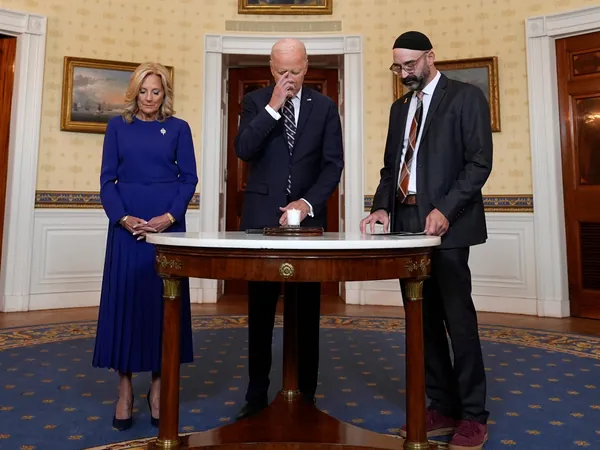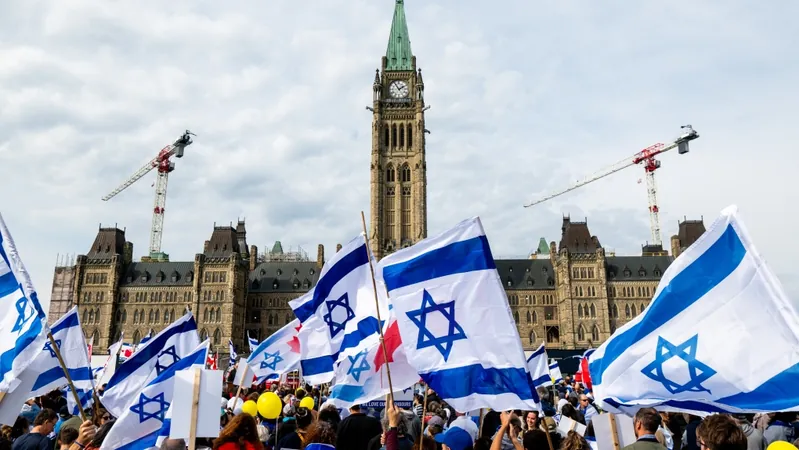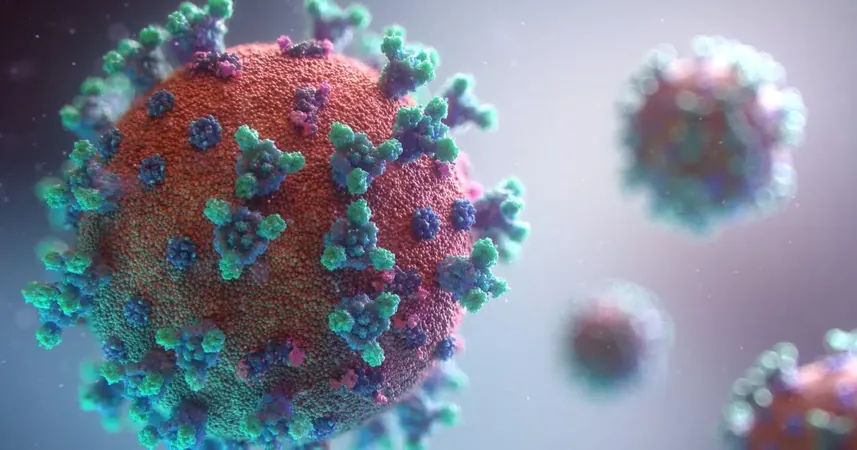
Vigils and Protests Mark One Year Since Brutal October 7 Attack as Israel's War on Gaza Intensifies
2024-10-08
Author: Amelia
Commemoration of October 7 Attack
As the United States reflects on the devastating October 7 attack carried out by Hamas, which resulted in the tragic loss of 1,139 lives and the abduction of around 250 individuals, President Joe Biden and high-ranking officials emphasize unwavering support for Israel. During a solemn commemoration at the White House, Biden described the attack as an act of "unspeakable brutality," urging Americans to honor the memories of those lost that day.
Calls for Condemnation of Israeli Actions
However, amid this solemn reflection, human rights advocates quickly pointed out a glaring omission in Biden's remarks: the absence of sufficient condemnation regarding the Israeli military operations in Gaza, which have claimed over 41,900 Palestinian lives since the onset of the conflict. Critics note that Biden’s statements seemed to disproportionately place the blame on Hamas for the suffering in Gaza, viewing October 7 as a "dark day for the Palestinian people because of the conflict that Hamas unleashed."
Biden's Steadfast Support of Israel
Since the war broke out, Biden has faced significant scrutiny for his steadfast support of Israel, failing to reprimand its military actions despite increasing calls from various advocacy groups for the U.S. to leverage its considerable military aid—currently at $3.8 billion annually—to push for a ceasefire. In light of these events, the Biden administration has approved an additional $14 billion in aid to Israel since last October.
Humanitarian Crisis in Gaza
Nancy Okail, president of the Center for International Policy, highlighted the ongoing suffering on both sides of the conflict, stating, "We cannot look away from the tens of thousands of Palestinian civilians killed, wounded, orphaned, and malnourished as a result of Israel’s ongoing and often indiscriminate assault on Gaza." Okail's statement serves as a reminder of the humanitarian crisis that has unfolded amid the political turmoil.
Protests Across the U.S.
In reaction to the government's handling of the situation, protests erupted across the U.S., as demonstrators accused the Biden administration of complicity in Israel's military actions against Gaza and the occupied West Bank. In cities like New York, Washington D.C., and Los Angeles, thousands marched, demanding an end to Israeli attacks. Diverse groups, ranging from student organizations to labor unions and pro-peace Jewish collectives, came together in solidarity for Palestinian rights.
Challenges for Student Activism
Reports from Al Jazeera highlight the evolving and increasingly cautious nature of student activism following a governmental crackdown on previous demonstrations. Despite challenges, students express renewed determination to fight for their cause, adapting their strategies to ensure their voices are not silenced.
Political Reactions and Upcoming Elections
As the anniversary unfolds, key political figures are also weighing in. Vice President Kamala Harris condemned the horrific events of October 7 while grappling with the consequences of the war in Gaza. Despite expressing grief over the humanitarian crisis, she, like Biden, refrained from directly placing blame on Israel, asserting her dedication to combating the threat posed by Hamas.
Meanwhile, former President Donald Trump spoke to Jewish leaders, reasserting the strong bond between the U.S. and Israel, asserting that if elected, he would fortify this relationship even further.
Conclusion: A Year Marked by Loss and Urgency for Resolution
The approaching U.S. election on November 5 looms over these discussions, raising questions about how candidates will navigate the complex and contentious relationship with Israel and the ongoing crisis in Gaza. As vigils and protests continue, Americans are left to contend with a year marked by profound loss, difficult choices, and the urgent call for a resolution to the escalating conflict.









 Brasil (PT)
Brasil (PT)
 Canada (EN)
Canada (EN)
 Chile (ES)
Chile (ES)
 España (ES)
España (ES)
 France (FR)
France (FR)
 Hong Kong (EN)
Hong Kong (EN)
 Italia (IT)
Italia (IT)
 日本 (JA)
日本 (JA)
 Magyarország (HU)
Magyarország (HU)
 Norge (NO)
Norge (NO)
 Polska (PL)
Polska (PL)
 Schweiz (DE)
Schweiz (DE)
 Singapore (EN)
Singapore (EN)
 Sverige (SV)
Sverige (SV)
 Suomi (FI)
Suomi (FI)
 Türkiye (TR)
Türkiye (TR)